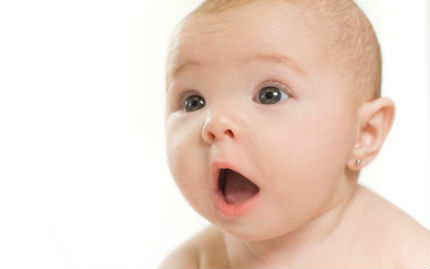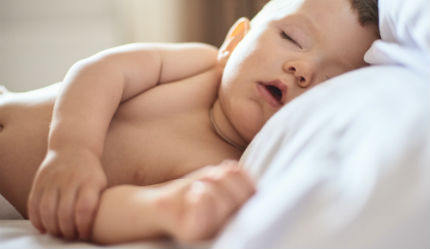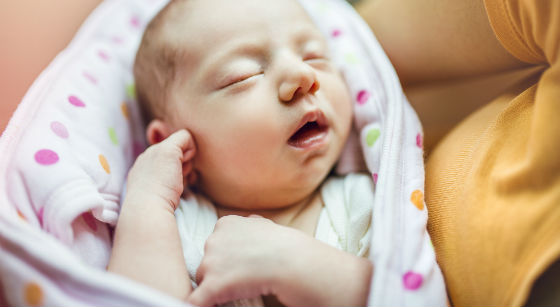Having a baby means that you worry constantly. That’s why it’s important to understand when that worry warrants extra concern and possibly a hospital visit, and when it’s just normal baby behavior.
It’s typical for babies between the ages of 9-12 months to experience heavy breathing during sleep. What this article will try and do is help you to differentiate between a baby’s natural sleeping habits and a situation where they are having breathing problems. If a baby gasps for air while awake or sleeping it could be worrying.
Why does your baby gasp for air while sleeping or awake?
To start off, you need to identify why your baby is gasping for air while sleeping. It could be for a number of different reasons, such as:
1. A noticeable difficulty breathing
If they have trouble breathing:
- They may begin to grunt.
- Their nostrils may flare.
- The muscles in their chest and their neck will retract visibly.
2. Laryngomalacia
This medical condition is completely harmless, despite its intimidating name. It involves the softening of the baby’s voice box, which results in their breathing becoming louder.
This gives the impression that your baby is gasping for air while sleeping but it is temporary. They may wheeze when they inhale, this will get worse if they are crying or feeding.

3. Immature Respiratory System
Babies aren’t born with fully developed respiratory systems, especially if they are born prematurely. In such cases, the underdevelopment of their respiratory functions may cause breathing difficulties and this can cause the baby to gasp for air while awake and also when sleeping.
Infants experiencing this breathing abnormality will typically compensate for their gasps by breathing normally immediately after them.

4. Gastrointestinal Reflux
It’s commonly known as ‘colic’ and it occurs when the infant’s gastrointestinal tract functions ineffectively. As a result, your baby gasps in his sleep. They might spit up also after feeding.
This condition is usually easy to treat, just adjust your infant’s sleeping position and give him a formula for breaking down his food so that his systems can digest the food.
5. Sleep Apnea
This is the most harmful medical condition that a baby can experience while sleeping. It’s a sleeping disorder in which your baby doesn’t simply hyperventilate – his breathing will start and stop.
Sleep Apnea is typically caused by the underdevelopment of a baby’s bodily systems or as a consequence of other medical conditions such as being underweight.
Baby Gasping for Air: When should you worry
Once you’ve identified why your baby gasps for air when sleeping, you need to now determine whether the matter is concerning or not. Here are some signs and additional symptoms that your baby might exhibit. If they display these signs, you should definitely contact a doctor.
1. Your babies skin changes color
If your baby starts to get a blue tinge when they have trouble breathing, you should consult a doctor. This change in color may occur on their tongue, hands, and lips.
2. Their breathing levels increase
If your baby’s hyperventilating and their breathing rates exceed 60 breaths per minute, you should be concerned. This is a clear indication that they aren’t receiving enough oxygen in their lungs and they are trying to increase their oxygen intake.
3. They are experiencing long pauses in their breathing
If your baby is having breathing problems you’ll need to monitor them. When their breathing per minute is low, try to wake them up and move them around as it will help the oxygen to reach their lungs.
It’s a cause of concern if your baby gasps for air when sleeping and then they don’t breathe for around 10 seconds.
4. They have trouble feeding.
You should keep an eye on your baby’s feeding patterns. If there is a significant negative change in their feeding, along with their respiratory distress, you should consult a doctor.
5. Baby seems lethargic
Your baby may become less energetic if he has a significant respiratory condition. He’ll seem to be a bit sluggish and sleep for longer than is usual. In more serious cases, baby will not be alert- he may not smile or react or respond to the things around him. They may also be too weak to cry.
6. They develop a fever
Some lung infections may be accompanied by a fever. A baby’s natural temperature is about 97.5F. If your baby has a fever it’ll be around 100.4F.
Monitoring and Managing the situation
It’s hard to see your baby gasping for air when sleeping or awake, but it’s important for you to remain calm so that you can assess the situation.
When in doubt, consult a doctor. But here are some steps that you can follow that help your baby if he begins to hyperventilate.
- Keep an eye on babies’ sleeping position.
- Stop him from lying on his back – if your baby gasps for air when sleeping make sure that he is lying on his side or on his stomach.
- Make sure that there isn’t anything blocking the air from entering his nose and mouth. This could be a blanket. It could also be the bed sheet if he is lying on his stomach. In such situations, you’ll need to make sure that his face is tilted to the side.
- If your baby gasps for air when sleeping, record his breathing patterns for a short period of time. This will help you to give the doctor the information that he needs to help you.
- Keep an eye on the sounds that your baby makes when he/she is gasping for air. This is important as it will help the doctor with the diagnosis. Is he wheezing? Are his breaths swift and labored? Do his breaths make a whistling noise? Is your baby coughing?

Conclusion
It can be scary if your baby gasps for air while sleeping or awake.
But it’s important to differentiate between what’s normal for a baby and what requires medical attention. So, look for the signs and if in doubt seek medical attention.

